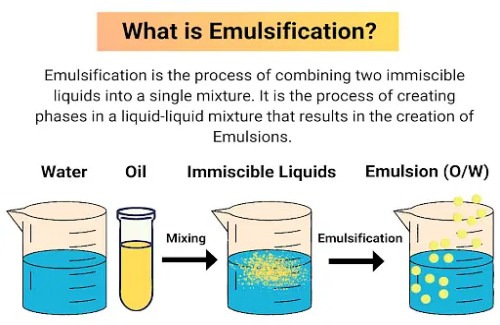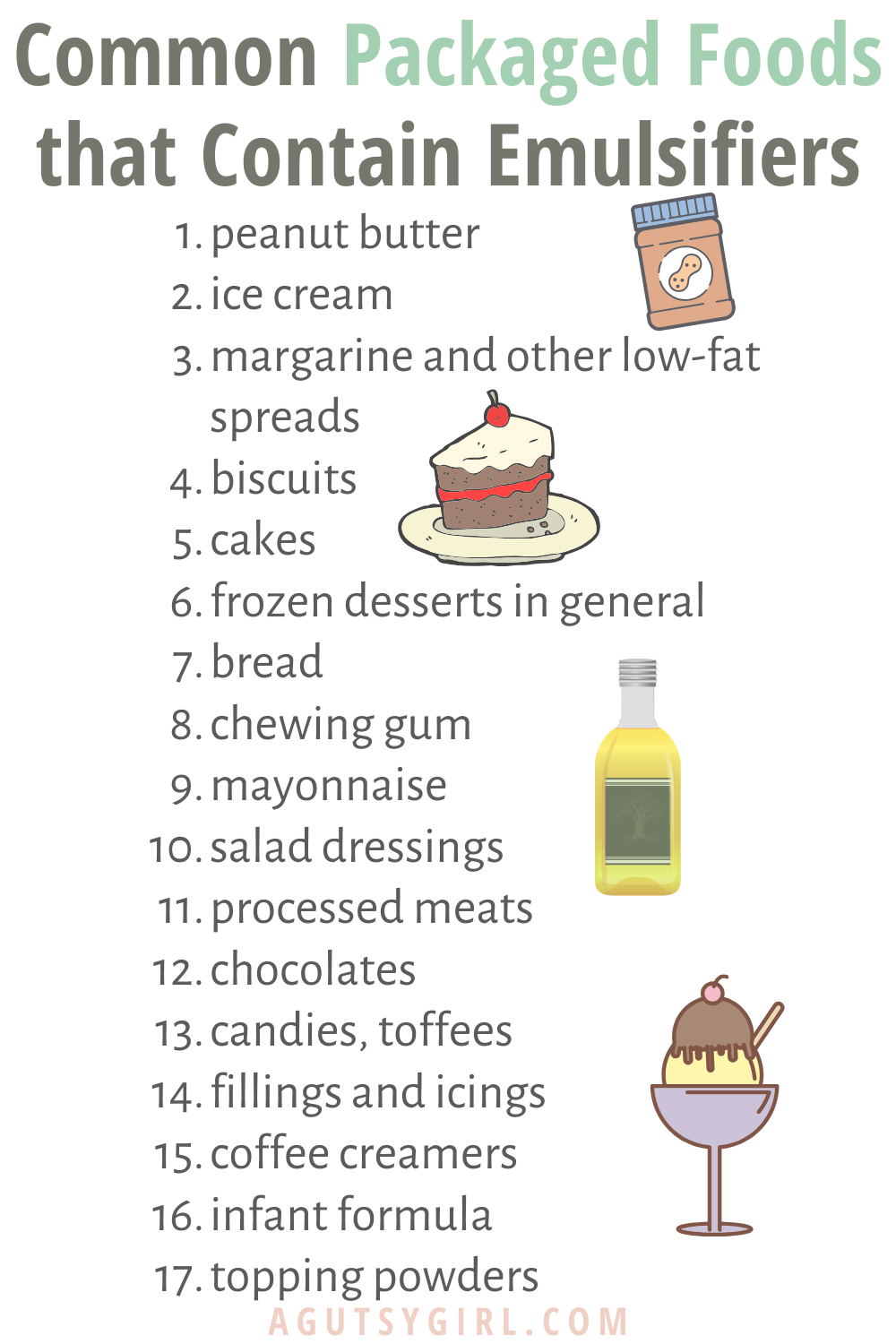The Scientific research Behind Emulsifiers and Their Value in Modern Production
Emulsifiers play an important role in modern-day manufacturing, serving as the unhonored heroes that blend oil and water for a wide variety of products. You might not understand just how these compounds improve appearance and stability, yet their influence is considerable throughout industries. As customer choices change towards cleaner labels, the need for cutting-edge emulsifiers is growing. What does this mean for the future of product solution? Allow's check out further.
What Are Emulsifiers?
Emulsifiers are important agents on the planet of food and item manufacturing, acting as the glue that binds 2 otherwise immiscible liquids, like oil and water. You could not recognize it, but these compounds play an important role in developing steady mixes. They minimize the surface tension in between these fluids, enabling them to mix seamlessly. Common examples consist of lecithin found in egg yolks and soybeans, and mono- and diglycerides utilized in numerous refined foods.

When you whip up a salad dressing or enjoy a luscious dessert, emulsifiers assist maintain that perfect texture. They assure your products have a consistent mouthfeel and look, boosting your total experience. Without emulsifiers, lots of foods would certainly separate, leading to unwanted structures and flavors. Following time you appreciate a smooth sauce or spread, bear in mind the unhonored heroes-- emulsifiers-- that make it all feasible.
The Chemistry of Emulsification
When you blend oil and water, you may discover they do not blend easily; that's where the chemistry of emulsification comes right into play. To overcome this difficulty, emulsifiers are employed.
These particles have a hydrophilic (water-attracting) head and a hydrophobic (water-repelling) tail. When you add an emulsifier, its molecules place themselves at the oil-water interface, decreasing surface tension and allowing the beads to mix. The emulsifier develops a protective layer around each bead, stopping them from coalescing back right into different layers. Understanding this chemistry is crucial for achieving security in products like dressings, lotions, and sauces, making emulsification necessary in modern-day manufacturing.
Kinds of Emulsifiers
Various kinds of emulsifiers play essential duties in supporting combinations of oil and water. You'll commonly experience two major groups: natural and artificial emulsifiers. Natural emulsifiers, like lecithin from egg yolks or soy, are derived from plants and pets, making them preferred in food. They're typically thought about safer and healthier options.
On the various other hand, artificial emulsifiers, such as mono- and diglycerides, are chemically engineered to improve stability and service life. They're commonly used in refined foods and cosmetic items.
In addition, you could discover non-ionic, anionic, and cationic emulsifiers, each with unique buildings that affect their efficiency. Non-ionic emulsifiers, for instance, job well in a large range of pH degrees, while anionic emulsifiers have a tendency to carry out much better in alkaline problems. Comprehending these kinds can help you select the right emulsifier for your certain application.
Devices of Emulsion Formation
Understanding how emulsions develop is vital for creating stable mixes of oil and water. When you introduce an emulsifier, it decreases the surface tension between the 2 fluids, enabling them to blend even more quickly.
The emulsifier molecules have a hydrophilic (water-attracting) head and a hydrophobic (oil-attracting) tail. When you add an emulsifier, these particles organize themselves at the oil-water interface. The hydrophilic heads interact with water, while the hydrophobic tails anchor into the oil. This produces a barrier that maintains the beads, preventing them from coalescing.
Applications of Emulsifiers in Numerous Industries
Emulsifiers play an important role throughout various markets, making your favored foods smoother and much more enjoyable. In cosmetics, they improve item structure and security, ensuring a pleasurable application experience. Plus, in pharmaceuticals, they aid provide important active ingredients properly, boosting overall efficacy.
Food Industry Uses
While you could not understand it, emulsifiers play a necessary function in the food sector, enhancing the structure, stability, and life span of several items (Emulsifiers). They're commonly found in salad dressings, sauces, and mayonnaise, assisting to blend oil and water for a smooth, consistent product. In baked goods, emulsifiers boost dough handling and keep moisture, causing a much better structure and expanded freshness. They're also important in milk products, where they maintain solutions in lotions and gelato, avoiding splitting up. Even in snacks, emulsifiers help keep crunchiness and avoid stagnant tastes. By making certain harmony and quality, emulsifiers are substantial to supplying the tasty products you delight in on a daily basis, making them a crucial ingredient in modern food manufacturing.
Cosmetic Formulas Advantages
When it pertains to cosmetic formulas, emulsifiers are essential for creating products that feel extravagant and execute successfully. They aid blend oil and water, guaranteeing a smooth and stable consistency in lotions, lotions, and serums. You'll see that emulsifiers improve item security, protecting against separation and prolonging life span. This implies you can enjoy your preferred cream without fretting about it spoiling as well promptly. In addition, emulsifiers enhance the application experience, permitting even circulation and much better absorption right into the skin. By utilizing emulsifiers, you also accomplish a more appealing appearance, making your cosmetics really feel fascinating on your skin. In general, emulsifiers play an important function in providing high-grade cosmetic products that meet your elegance demands.
Drug Applications Overview
In the pharmaceutical industry, emulsifiers are important for formulating efficient medications. They aid produce steady blends of oil browse around this site and water, ensuring that energetic ingredients are equally dispersed and easily absorbed by the body. You'll discover emulsifiers in various dosage forms, like lotions, ointments, and fluid suspensions, improving the bioavailability of drugs. They also boost the texture and stability of products, making them more appealing and easier to use.
The Effect of Emulsifiers on Product High Quality

By ensuring steady solutions, you reduce the danger of wasting and expand rack life, ultimately saving you money and time. You'll additionally find read here that emulsifiers can enhance the bioavailability of energetic ingredients in your products, making them a lot more efficient for consumers.
Moreover, they enable you to produce innovative solutions that meet varied customer needs. Whether you're crafting a velvety dressing or a glamorous lotion, emulsifiers are necessary for accomplishing the preferred outcomes. Basically, by recognizing and leveraging the impact of emulsifiers, you can significantly boost the high quality of your products.
Future Trends in Emulsifier Growth
As the demand for cleaner tags and sustainable products rises, the advancement of brand-new emulsifiers is readied to develop significantly. You'll discover a shift in the direction of plant-based and all-natural emulsifiers, driven by consumer choices for ingredients that are eco-friendly and less refined. Technologies in biotechnology will likely improve the performance and performance of these emulsifiers, enabling manufacturers to create secure formulations with fewer additives.
You could additionally see a rise in multifunctional emulsifiers that not just maintain emulsions but also boost taste, texture, or nutritional value. This fad could streamline active ingredient listings while improving item performance.
Furthermore, with advancements in nanotechnology, emulsifiers might be crafted at the molecular degree to accomplish unmatched stability and performance. Emulsifiers. As you explore these patterns, you'll discover that the future of emulsifier growth is not practically functionality, but additionally concerning embracing sustainability and openness in components
Often Asked Questions
Are Emulsifiers Safe for Consumption in Food Products?
Yes, emulsifiers are normally safe for intake in food items. They've been thoroughly examined and authorized by food safety authorities, so you can appreciate your favored foods without fretting concerning their influence on your health.
Can Emulsifiers Be Derived From All-natural Resources?
Yes, you can obtain emulsifiers from natural resources. Components like lecithin from egg yolks or soybeans and casein from milk prevail. These all-natural emulsifiers help support blends without synthetic additives, making them popular in different products.

Just How Do Emulsifiers Influence Service Life of Products?
Emulsifiers stabilize combinations, preventing separation and perishing - Emulsifiers. By maintaining harmony, they expand products' service life, ensuring freshness and top quality. You'll observe that emulsifiers aid keep your preferred foods and cosmetics executing well over time
What Are Possible Negative Effects of Emulsifiers?
You may experience digestion problems when consuming items with emulsifiers, as they can disrupt gut microorganisms. Some researches recommend prospective links to inflammation or allergies, but a lot more study is needed to completely understand these impacts.

Are There Alternatives to Typical Emulsifiers?
Yes, there are alternatives to traditional emulsifiers. You can try this web-site discover choices like natural gum tissues, starches, or lecithin. Each different offers special residential properties, so experiment to discover what jobs best for your particular application.